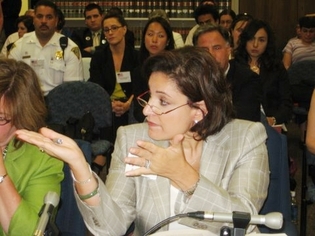 (Updated 8:39 p.m.) It’s official: New Haven won’t have to release the names of recipients of its immigrant- friendly ID cards, thanks to a ruling late Wednesday afternoon by the state Freedom of Information Commission.
(Updated 8:39 p.m.) It’s official: New Haven won’t have to release the names of recipients of its immigrant- friendly ID cards, thanks to a ruling late Wednesday afternoon by the state Freedom of Information Commission.
The FOIC voted 3 – 1 at its Hartford headquarters to uphold a June 25 proposed decision by one of its members. That decision denied a request by opponents of the city’s immigration policies to release the 5,000-plus names. Opponents said they wanted to turn the names over to federal immigration authorities to try to sink the city’s immigrant-friendly policies.
“The Commission’s decision today is a vindication for the city,” the city’s point person on the ID program, Community Services Administrator Kica Matos, stated in a City Hall press release issued after the ruling. “As we prepare to celebrate the one-year anniversary of this successful program it’s important that New Haven residents feel safe and comfortable applying for an Elm City Resident Card with the peace of mind that their information will be kept private.”
The decision brings to an end, for now, a battle that pitted the public’s right to know against the safety of newcomers to this country. However, anti-illegal immigration activist Dustin Gold vowed after the ruling that his group will appeal the decision to Superior Court. Gold was one of two plaintiffs who filed the original request to have the names made public.
 Manchester journalist Chris Powell (at right in photo beside Gold), the other complainant, said he wasn’t yet sure whether he would appeal in court, or seek redress in the legislature.
Manchester journalist Chris Powell (at right in photo beside Gold), the other complainant, said he wasn’t yet sure whether he would appeal in court, or seek redress in the legislature.
“The guts of this case is hearsay,” Powell told the commissioners, “and I never had a chance to rebut it.”
In the end, commissioners expressed sympathy with the argument made by the city and its expert witnesses that threats of violence against city officials and immigrants in general warranted keeping the identities of cardholders secret. The cards are not held just by immigrants, but they are designed to help immigrants integrate into city life. The cards entitle holders to access to city services like libraries and parks, and are designed as secondary documentation to help open bank accounts.
The city’s police chief, the Fair Haven neighborhood’s top cop, and the state’s homeland security chief all testified in previous hearings that they believed that releasing the names would endanger public safety. Kica Matos received a death threat because of her role in crafting the ID program. (Click here, here and here to read about that. Click here to read the original FOIC decision that was upheld Wednesday.)
Deborah Torres (pictured at the top of this story), attorney for Unidad Latina en Accion, one of the groups supporting the city’s position, credited the testimony of New Haveners on the front lines of immigration issues with helping to win the case. She also said opposing witnesses helped buttress the city’s case.
“Because it’s perceived as a program for illegal immigrants, people with foreign-sounding names, people who speak Spanish, people who advocate for undocumented immigrants, will be targeted. Most of the expert testimony that the complainants put on used Hispanics and Latinos as a proxy for illegal immigrants,” Torres noted.
Opponents got one last chance Wednesday to make their case at a two-hour hearing before the FOIC ruled.
They argued that the case shouldn’t have been decided on security grounds, but rather on whether the city’s reasons for keeping the names secret met the specific requirements of state freedom of information law.
“It strikes me as an incredible irony if a statute that says ‘homeland security’ in it is going to be construed to provide government identification documents to illegal aliens,” Chris Powell said. “It was passed in response to an attack on this country by illegal aliens, and if this is how we end up. God help us.”
“I resent very much the anonymous nature of the complaints,” Powell added.
The one commissioner who dissented was Andrew O’Keefe, the FOIC’s chairman. He said during public debate by the commissioners that he disagreed with the reliance on tales of anonymous threats as a basis for the decision. Those alleged threats shouldn’t overrule freedom of information law, he said. “Every time I walk across the street there’s a risk” of being hit by a car.
But that’s a random risk, responded Commissioner Sherman D. London, who wrote the original decision. This is a targeted risk, he said.
City Hall’s Kathleen Foster was the lead attorney making New Haven’s case in the hearings.